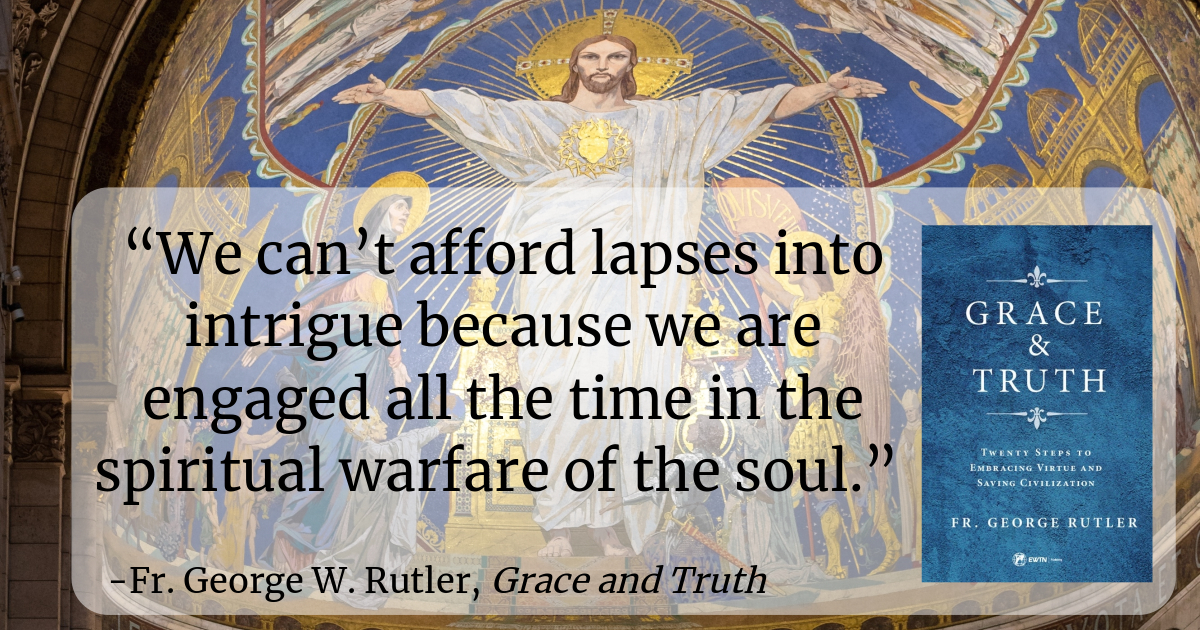The word “intrigue” can refer to two different phenomena. The first is simple fascination.
But there is a second kind of intrigue. And that, says the book of Proverbs, is an abomination to God (6:18). This fascination is not harmless or morally neutral, and it certainly is not the first level of an approach to God. It is really rejection of God and His goodness. This kind of intrigue, condemned by the rabbis and then by the prophets and the Fathers of the Church, is the devising of wicked imaginings, the distortion of the imaginative faculty to plot against God.
Intrigue and the Passion
The whole Passion narrative of Christ is a drama of that second kind of intrigue. When He was preaching, people began to plot how they could capture Him. When He proclaimed His Messiahship in His native synagogue in Nazareth, the crowd tried to grab Him and throw Him off the brow of a hill. It was not yet His time, and He escaped from their midst.
The human intellect is a gift from God, and it must be used as He intended — to glorify Him. The imaginative component of the intellect can remember the past and can anticipate the future. And so the imagination can civilize us by collecting and organizing the inheritance left by those who have gone before — their stories and wisdom and experience. And it can encourage us through contemplation of what we can build, what we can design, what we can hope for. But that same imagination can turn in on itself. We can be haunted by the past. We can be threatened by the future. And we can use its power for destructive purposes.
When Our Lord was taken before Pontius Pilate, the crowd cried out what no Jewish voice in Jerusalem had ever said before: “We have no king but Caesar” (John 15:19). This unprecedented surrender to civil authority over the power of the Lord of Israel was clearly the result of the misuse of the imaginative faculty — that is, an intriguing against God. Pontius Pilate and Herod also intrigued between themselves: they became friends as they plotted against Christ to cement their own power.
If you go through the Passion narratives, you can identify every personality that has ever lived. All the foibles of the human race are on display in one character or another. We cannot look at these characters as though they are somehow distinct from us, for in every one of them is a part of our own soul. God has given us the Passion narratives, edited by the Holy Spirit, so that we can have the anecdotes and dialogues and characters He wants us to know. This heavenly script is an examination of conscience for us and our ego’s intrigues against the divine design.
Jesus says, “I am the Way, the Truth, and the Life.” But the ego resists that, and that’s why we can look for two thousand years at the Way Himself and still find ourselves wandering away from Him. After two thousand years, we can look the Truth straight in the face and still lie about Him. After two thousand years, we can look at the Lord of life and still fall prey to the conceit that life is just a biological accident.

Narcissus
The Greeks had a parable about the dangers of the autonomous ego in the story of Narcissus. Narcissus was fascinated with himself. Now, it can be healthy to be fascinated with yourself. A child spends the first several months of his life aware of practically nothing but the self, discovering his own parts, his mechanism for living. This is part of natural growth. But there comes a moment when the infant becomes aware of the world around him. The word “idiot” really means someone who is totally aware of the self and only the self, oblivious to the other — other people, the outside world, and the Holy Other Who is God.
Narcissus was that kind of moral idiot. He became enamored of his reflection in the water. He wanted to discover, in the jargon of our day, his “inner child.” But anyone who wants to find his inner child without locating the source of life in God is condemned to a perpetual infancy, an arrested development of the soul.
The autonomous self ignores the voice of the other, all others. And so it was with Narcissus, for Echo called to him, bidding him to come and be her lover. Narcissus was so involved with himself that her voice fell, literally, on morally deaf ears. She dissolved into nothing but her voice, which is how we get the word “echo.” Narcissus ended up dissolving into a plant that is named for him.
The pathology of modern man has consisted in that kind of moral deafness to God, a self-centeredness that is born of intrigue. When we plot, according to our own devices, to reorder the world according to our own preferences, self-interest, and self-love, we ignore the voice of God. Our Lord says, “But to what shall I compare this generation? It is like children sitting in the market places and calling to their playmates, ‘We piped to you, and you did not dance; we wailed, and you did not mourn’ ” (Matt. 11:16–17).
What is wicked about intrigue, then, is a self-idolatry that demotes God, or blocks Him out entirely.
Intrigue in Spiritual Warfare
We can’t afford lapses into intrigue because we are engaged all the time in the spiritual warfare of the soul. St. Peter knew all about that war: He had become a casualty of it by denying Christ. He gave in to a certain kind of intrigue when he sat by the fire and said, “I do not know him” (Luke 22:57). But in humility Peter recovered the right use of his imagination. As the Prince of the Apostles, he wrote to the early Christian churches, telling them,
“Be sober, be watchful. Your adversary the devil prowls around like a roaring lion, seeking some one to devour. Resist him, firm in your faith” (1 Pet. 5:8–9).
That warning has been part of the Night Prayer of the Church for centuries, appropriately designated to be read when darkness has fallen and we are tempted to think that the Light of Christ is hidden. You can almost hear the paws of the lion roaming about the soul.
Satan, after all, is the great intriguer. All human intrigues pale in comparison with his great intrigue against Christ. The worst crimes humans have ever committed in history are mere playthings compared with the vicious scheming of the prince of lies against the Lord of Truth. And here’s the thing: He wants us to become part of his intrigue. In our current generation, he wants us to use all the scientific information and communication technology at our hands to perpetuate his plotting against the divine design. He wants us to think that we have no home but our earthly dwelling. He wants us to think that there is no heavenly purpose to our existence.
After Theodore Roosevelt left the White House, he went on a safari in Africa and toured Europe. He was wined and dined, given honorary degrees, and returned to his native city of New York, where he was welcomed with great pageantry. On the ship with him were two missionaries who had spent many years in laborious service for the Gospel and the salvation of souls. When they saw all the acclamation given to Roosevelt, one said to the other, “They don’t even know we exist.” And the other replied, “But we are not yet home.”
Each one of us has a home with God. And the only way we can make sense of our earthly home, the only way we can properly use our advanced technology, and the only way we can really know what to say and to do with all our means of communication is to understand that we have a heavenly destiny. If we plot and intrigue against God, we will become the first casualties in our spiritual battle. For if life has no purpose, then there is no reason for us to put up with the challenges of everyday life. The slothful soul easily surrenders to the ennui that has become the undercurrent of our fading modern age.
Our Lord does not condemn us for the mistakes we have made in this culture, nor for the sins we have committed by our intellect and our will. What He does do, however, is judge how we pick ourselves up, remonstrate with Him for His grace and mercy, and go back out to proclaim that He is the Way, the Truth, and the Life.
In the Second World War, the entire fate of Europe and, consequently, Western civilization hung in the balance. Winston Churchill was one of those characters in history who are hard to explain apart from divine providence. It’s not that he was a mystic or a great confessor of the Faith or a saint raised to the altars, but that he was a man with all the gifts needed for that moment in order to resist the denial of God instituted in a political system.
In those dark days, Churchill knew that across the Channel there was an evil man and an evil system intriguing against God, and so he walked around the garden singing this simple song: “Keep right on to the end of the road. Keep right on to the end. Though the way be long, let your heart be strong. Keep right on to the end. If you are tired and weary, still journey on till you come to your happy abode, where all you love and you’re dreaming of will be there at the end of the road.”
Our Lord told us just that two thousand years ago. He said to the Apostle Philip what he says to us now at the end of a long period of intriguing against God by civilization in the West and in the East, “Have I been with you so long, and yet you do not know me?” (John 14:9).
✠
This article is adapted from a chapter in Fr. Rutler’s Grace and Truth: Twenty Steps to Embracing Virtue and Saving Civilization. It is available from Sophia Institute Press.
Photo by Stephanie LeBlanc on Unsplash














